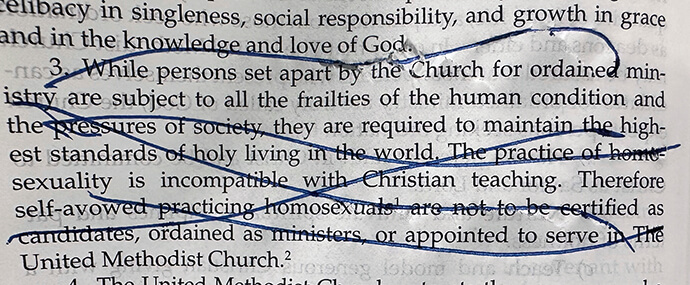Key points:
- Tom Lee received a letter in 2019 from a former pastor who acknowledged his role in crafting the 1984 legislation barring gay clergy.
- The Rev. Richard Timberlake had come to change his stance and regret his role in that General Conference decision.
- Lee participated in fulfilling his pastor’s dying wish and imagines many more, dead and alive, carrying such hopes.

Photo courtesy of the author.
Commentaries
The letter came in July 2019, shortly after I was elected part of the delegation to represent the Tennessee Conference of The United Methodist Church at our 2020 General Conference.
The author was the Rev. Richard Timberlake. He had been my pastor as a young adult in the 1980s in Knoxville. He addressed his letter to “Friend Tom.”
“As you know, this is a crucial time in the life of our church,” he wrote. “It happens that I have been there and done that.”
United Methodist records — and we are extremely diligent at recordkeeping — back up what Rev. Timberlake told me next. He had been a clergy delegate to four United Methodist General Conferences, quadrennial events at which the church’s elected leaders gather to set policy and polity for the next four years.
Or, as it could turn out, longer.
“In 1984, I was on the subcommittee that recommended the present language on homosexual clergy,” he wrote. “I was all for it.”
I did not know any of that.
Dick Timberlake was the person who cared for my parents in their aging. He counseled me. Six-foot-eight with a booming voice that required little amplification, he led a dynamic, growing congregation in my home church, whose commitment to faith in action I never doubted. I sang in the youth choir, participated in missions. All my contemporary friends were there. The adults of that church raised me up.
Did they also raise me to discriminate?
The May 10, 1984, headline in the New York Times confirms the event: “Methodists bar homosexuals from ministry.” The language Rev. Timberlake and others had passed was still in the church’s law book, the Book of Discipline, 40 years later in ¶304.3: “The practice of homosexuality is incompatible with Christian teaching. Therefore self-avowed practicing homosexuals are not to be certified as candidates, ordained as ministers, or appointed to serve in The United Methodist Church.”
The archives of the 1984 General Conference reflect an epic debate on this language that spilled from one day to the next. The debate didn’t so much center on whether to ban gay clergy but, rather, how to word it. The records show my pastor was, in the moment, more progressive than his letter admitted. He called for amendments and clarifications to soften the blow. He lost. He was ruled out of order.
Subscribe to our
e-newsletter
But the ban passed as Rev. Timberlake’s subcommittee had recommended. He was, in his words, “all for it.”
It would stay in the Discipline for 40 years.
I am not queer. For years, I did not feel the pain of isolation. It came to me, but slowly, through friends at my adopted United Methodist congregation in Nashville — passing out cups of lemonade with them at Pride events, embracing our daughter’s awakening and, finally, through the tumult following the 2019 special General Conference.
Far too late, having refused too many calls, I said “yes.” I put my name on a ballot and ran for delegate to the 2020 General Conference.
Five years later, I sat in my seat at General Conference in Charlotte, the 2020 conference having become the 2024 conference. Consent agenda A05 was before us. Tucked inside was item 474 from the Faith & Order Committee, petition no. 20177-FO-¶304.3-G. It deleted ¶304.3 in its entirety, effective immediately.
I voted “aye,” and 46 minutes and 16 seconds into the early morning plenary session, the consent calendar was adopted by a landslide vote of 692 to 51.
It was gone, all that struggle of long ago erased. I took out my copy of the Discipline and picked up a blue pen.

Queer delegates, who had borne the true brunt of ¶304.3’s prohibition, celebrated in the conference hall, singing Mark Miller’s “Draw the Circle Wide.” Dozens of us, tears streaming, bishops and laity, queer and straight, surrounded them in concentric circles of love as we sang:
Draw the circle wide, draw it wider still.
Let this be our song: no one stands alone.
Standing side by side,
Draw the circle, draw the circle wide.
The circle was wider. And Dick Timberlake’s work was no more.
I came home late Saturday, at once exhausted from the work and buzzy from the joy. I had gone to vote against the harmful language, and that language was overwhelmingly rejected.
On Sunday, I wanted to find the letter, for there is more that he wrote:
“In the past 35 years, my mind has changed. I have met a few people who are wired differently. They are as much God’s children as you and I are.
“I want my church to accept them.”
Dick Timberlake wrote me at age 93. He died a month later.
Five years later, and 40 years after his part in the 1984 adoption of ¶304.3, his dying wish was granted.
His church — our church — accepts everyone. The circle is wider still.
It’s been a long time coming, But I’d like to think, on a Sunday morning, that Dick Timberlake is not alone; that many more have tears streaming, singing hymns of unity; and that we shall all rise one day in joy.
Until then, rest in peace, dearest friend.
Lee is an attorney in Nashville, Tennessee. He was a Tennessee Conference lay delegate to the 2024 General Conference in Charlotte, North Carolina, where he was elected as lay alternate member of the Judicial Council.
News media contact: Tim Tanton or Joey Butler at (615) 742-5470 or newsdesk@umcom.org. To read more United Methodist news, subscribe to the free Daily or Weekly Digests.



